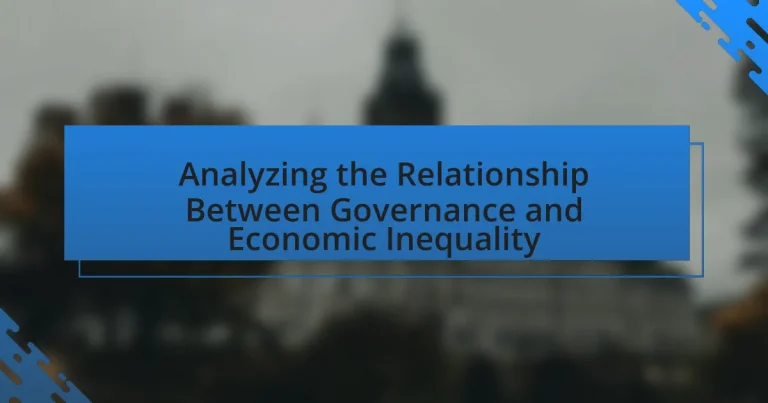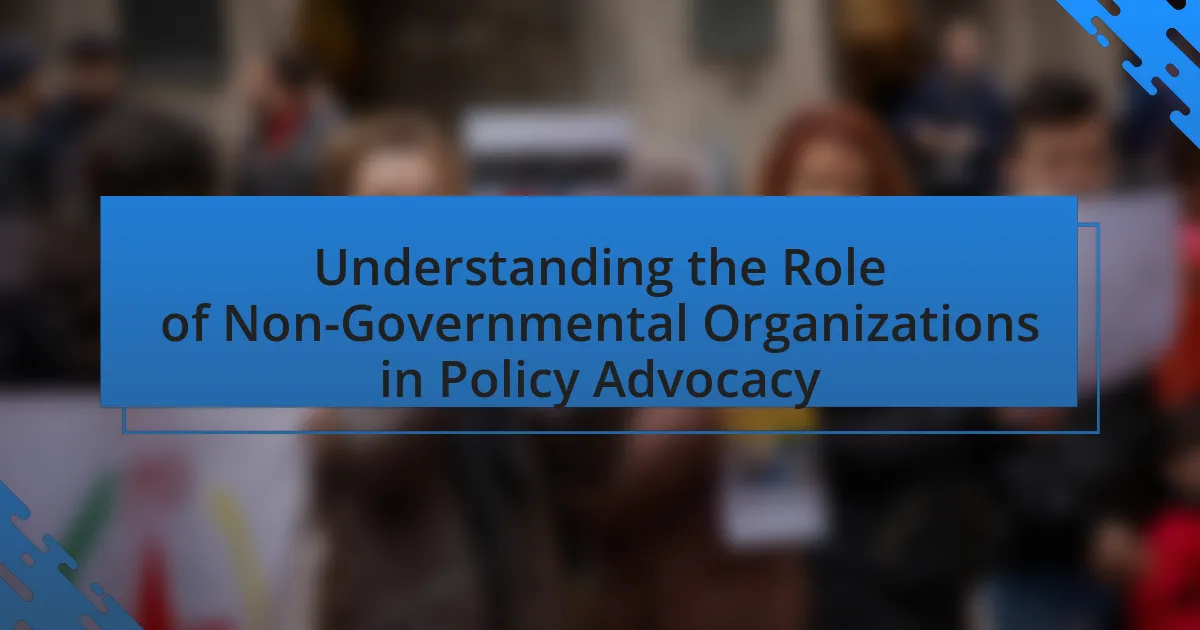The article analyzes the relationship between governance and economic inequality, highlighting how governance structures influence wealth distribution and access to resources. It discusses the impact of effective governance characterized by transparency and inclusiveness in reducing economic disparities, as evidenced by examples from various countries. Key governance models, such as liberal democracy and social democracy, are examined for their roles in shaping economic outcomes, while the article also explores the effects of political stability, taxation policies, and social welfare programs on inequality. Additionally, it addresses external factors like globalization and the influence of international organizations on national governance and economic disparities.

What is the relationship between governance and economic inequality?
Governance significantly influences economic inequality by shaping policies that determine wealth distribution and access to resources. Effective governance, characterized by transparency, accountability, and inclusiveness, tends to reduce economic inequality, as seen in countries with strong institutions that promote equitable economic opportunities. For instance, the World Bank reports that nations with higher governance scores, such as those in Scandinavia, exhibit lower levels of income inequality compared to countries with weaker governance structures, like those in parts of Sub-Saharan Africa. This correlation underscores the critical role governance plays in either mitigating or exacerbating economic disparities.
How do governance structures influence economic inequality?
Governance structures significantly influence economic inequality by determining the distribution of resources and opportunities within a society. For instance, countries with inclusive governance structures, such as those that promote democratic participation and equitable policy-making, tend to experience lower levels of economic inequality. Research by the International Monetary Fund indicates that inclusive institutions can lead to more equitable income distribution, as they facilitate access to education, healthcare, and employment opportunities for marginalized groups. Conversely, governance structures characterized by corruption, lack of transparency, and authoritarianism often exacerbate economic disparities, as they concentrate wealth and power in the hands of a few, limiting social mobility and access to essential services.
What are the key governance models that impact economic inequality?
The key governance models that impact economic inequality include liberal democracy, authoritarianism, and social democracy. Liberal democracies often promote free markets and individual entrepreneurship, which can lead to increased economic inequality due to varying levels of success among individuals. Authoritarian regimes may exacerbate inequality by concentrating wealth and power among a small elite, limiting opportunities for broader economic participation. Social democracies, on the other hand, typically implement policies aimed at wealth redistribution, such as progressive taxation and social welfare programs, which can mitigate economic inequality. Research indicates that countries with strong social safety nets and inclusive economic policies tend to have lower levels of inequality, as evidenced by the Nordic countries, which consistently rank high in equality metrics while maintaining robust economies.
How does political stability affect economic inequality levels?
Political stability generally reduces economic inequality levels by fostering an environment conducive to investment, growth, and equitable resource distribution. When a government is stable, it can implement consistent policies that promote economic development and social welfare programs, which help lift lower-income populations. For instance, countries like Norway and Sweden, characterized by political stability, have lower Gini coefficients, indicating less economic inequality. Conversely, nations experiencing political turmoil, such as Venezuela, often see increased inequality due to disrupted economic activities and weakened social safety nets. Thus, the correlation between political stability and reduced economic inequality is supported by empirical evidence from various countries.
Why is understanding this relationship important?
Understanding the relationship between governance and economic inequality is important because it directly influences social stability and economic growth. Effective governance can lead to equitable resource distribution, reducing disparities in wealth and opportunity. For instance, countries with strong governance frameworks, such as those ranked high on the World Governance Indicators, tend to exhibit lower levels of economic inequality, as evidenced by data showing that nations like Denmark and Sweden maintain both high governance scores and low Gini coefficients. This correlation underscores the necessity of understanding how governance structures impact economic outcomes, as poor governance often exacerbates inequality, leading to social unrest and hindered economic development.
What implications does economic inequality have on social stability?
Economic inequality significantly undermines social stability by fostering discontent and increasing the likelihood of social unrest. When wealth is concentrated in the hands of a few, the majority may feel marginalized and disenfranchised, leading to heightened tensions within society. Historical evidence supports this, as seen in the Arab Spring, where economic disparities contributed to widespread protests and regime changes across several countries. Additionally, research from the International Monetary Fund indicates that countries with higher levels of income inequality experience more frequent episodes of civil conflict and political instability. Thus, economic inequality poses a direct threat to the cohesion and stability of societies.
How can governance reforms address economic inequality?
Governance reforms can address economic inequality by implementing policies that promote equitable resource distribution and enhance access to opportunities. For instance, reforms that strengthen anti-corruption measures can ensure that public resources are allocated fairly, reducing the wealth gap. Evidence from the World Bank indicates that countries with effective governance structures experience lower levels of income inequality, as transparent systems foster accountability and equitable service delivery. Additionally, reforms that improve education and healthcare access can empower marginalized communities, leading to increased economic mobility and reduced disparities.

What factors contribute to the relationship between governance and economic inequality?
Governance significantly influences economic inequality through factors such as policy decisions, institutional quality, and corruption levels. Effective governance can lead to equitable resource distribution and social welfare programs, which reduce inequality. For instance, countries with strong institutions and transparent policies, like the Nordic nations, exhibit lower economic inequality due to their progressive taxation and robust social safety nets. Conversely, nations with high corruption and weak governance, such as those in parts of Sub-Saharan Africa, often experience increased economic disparity as resources are misallocated and concentrated among elites. This correlation is supported by research from the World Bank, which indicates that improved governance can lead to a decrease in income inequality by promoting inclusive economic growth.
How do policies shape economic outcomes in different governance systems?
Policies significantly shape economic outcomes by influencing resource allocation, investment decisions, and regulatory environments within various governance systems. For instance, in democratic systems, policies that promote transparency and accountability often lead to higher levels of foreign direct investment, as evidenced by the World Bank’s Governance Indicators, which show a correlation between good governance and economic growth. Conversely, in authoritarian regimes, policies may prioritize state control over market mechanisms, leading to inefficiencies and reduced economic dynamism, as seen in countries like Venezuela, where heavy regulation and state ownership have resulted in economic decline. Thus, the nature of governance directly impacts the effectiveness and outcomes of economic policies, shaping overall economic performance and inequality levels.
What role do taxation policies play in economic inequality?
Taxation policies significantly influence economic inequality by determining how wealth is distributed across different income groups. Progressive taxation, where higher income earners pay a larger percentage of their income in taxes, can reduce inequality by redistributing wealth to fund public services and social programs that benefit lower-income individuals. For instance, in countries like Sweden, a high progressive tax system has been linked to lower levels of income inequality, as evidenced by a Gini coefficient of 0.27 in 2020, compared to the United States, which had a Gini coefficient of 0.41. Conversely, regressive taxation systems, which disproportionately burden lower-income individuals, can exacerbate economic disparities. Research from the International Monetary Fund indicates that countries with lower tax rates on the wealthy tend to experience higher levels of inequality, highlighting the critical role taxation policies play in shaping economic outcomes.
How do social welfare programs impact economic disparities?
Social welfare programs reduce economic disparities by providing financial assistance and resources to low-income individuals and families. These programs, such as unemployment benefits, food assistance, and housing subsidies, help to alleviate poverty and improve access to essential services. For instance, research from the National Bureau of Economic Research indicates that social safety nets can significantly decrease income inequality by redistributing wealth and providing support during economic downturns. Additionally, studies show that countries with robust welfare systems, like the Nordic nations, exhibit lower levels of economic inequality compared to those with minimal social support.
What external factors influence governance and economic inequality?
External factors that influence governance and economic inequality include globalization, technological advancements, and international trade policies. Globalization can lead to increased economic disparities as wealth becomes concentrated in certain regions, often leaving behind less developed areas. Technological advancements can exacerbate inequality by creating a skills gap, where individuals lacking technical skills are unable to compete in the job market. Additionally, international trade policies can favor certain industries or countries, impacting local economies and governance structures. For instance, the World Bank has reported that countries with open trade policies often experience greater economic growth, but this growth can be unevenly distributed, leading to increased inequality.
How does globalization affect governance structures and economic inequality?
Globalization significantly alters governance structures and exacerbates economic inequality. It leads to the decentralization of power, as national governments often cede authority to international organizations and multinational corporations, which can undermine local governance. For instance, the World Bank and International Monetary Fund influence economic policies in developing countries, often prioritizing market liberalization over social welfare, which can widen the gap between the wealthy and the poor. According to a report by the International Labour Organization, globalization has contributed to a rise in income inequality, with the richest 10% capturing a disproportionate share of global income growth, while the poorest remain stagnant. This dynamic illustrates how globalization reshapes governance and intensifies economic disparities.
What is the impact of international organizations on national governance and inequality?
International organizations significantly influence national governance and inequality by promoting policies that enhance democratic practices and economic development. For instance, organizations like the World Bank and the International Monetary Fund provide financial assistance and policy advice that often require countries to implement governance reforms aimed at reducing corruption and increasing transparency. These reforms can lead to improved public services and equitable resource distribution, thereby addressing economic inequality.
Moreover, research indicates that countries engaging with international organizations tend to experience better governance outcomes. A study by the United Nations Development Programme found that nations receiving aid linked to governance reforms showed a 20% improvement in governance indicators over a decade. This correlation suggests that international organizations play a crucial role in shaping governance structures that can mitigate inequality.

How can we analyze the effects of governance on economic inequality?
To analyze the effects of governance on economic inequality, researchers can employ quantitative methods such as regression analysis to assess the relationship between governance indicators (like political stability, rule of law, and corruption levels) and measures of economic inequality (such as the Gini coefficient). Studies have shown that countries with stronger governance structures tend to exhibit lower levels of economic inequality; for instance, the World Bank’s 2020 report indicates that nations with effective governance mechanisms have Gini coefficients that are, on average, 10% lower than those with weak governance. This correlation suggests that improved governance can lead to more equitable economic outcomes.
What methodologies are used to study this relationship?
Quantitative methodologies, such as regression analysis and econometric modeling, are commonly used to study the relationship between governance and economic inequality. These methods allow researchers to analyze large datasets and identify statistical correlations between governance indicators, like political stability and rule of law, and measures of economic inequality, such as the Gini coefficient. For instance, a study by Acemoglu and Robinson (2012) in “Why Nations Fail” demonstrates how variations in governance structures impact economic outcomes, providing empirical evidence that supports the use of these quantitative approaches. Additionally, qualitative methodologies, including case studies and interviews, are employed to gain deeper insights into the mechanisms through which governance affects inequality, as seen in the work of Piketty (2014) in “Capital in the Twenty-First Century,” which explores historical contexts and policy implications.
How do quantitative methods contribute to understanding governance and inequality?
Quantitative methods contribute to understanding governance and inequality by providing empirical data that reveals patterns and correlations between governance structures and economic disparities. For instance, statistical analyses can demonstrate how variations in governance quality, such as rule of law and political stability, correlate with income inequality levels across different countries. Research by the World Bank indicates that countries with stronger governance frameworks tend to exhibit lower levels of inequality, as measured by the Gini coefficient. This data-driven approach allows policymakers to identify effective governance practices that mitigate inequality, thereby facilitating targeted interventions based on solid evidence.
What qualitative approaches can provide insights into this relationship?
Qualitative approaches that can provide insights into the relationship between governance and economic inequality include case studies, interviews, and focus groups. Case studies allow for an in-depth examination of specific instances where governance structures have influenced economic outcomes, revealing patterns and causal mechanisms. Interviews with policymakers, economists, and affected communities can uncover personal experiences and perceptions regarding governance practices and their impact on inequality. Focus groups facilitate discussions among diverse stakeholders, enabling the exploration of collective views and the identification of common themes related to governance and economic disparity. These methods are validated by their widespread use in social science research, demonstrating their effectiveness in capturing complex social phenomena.
What case studies illustrate the governance-economic inequality link?
Case studies that illustrate the governance-economic inequality link include the analysis of Brazil’s Bolsa Família program and the impact of corruption in Nigeria. In Brazil, the Bolsa Família program, which provides financial aid to low-income families, has been linked to a reduction in poverty and inequality, demonstrating how effective governance can mitigate economic disparities. Conversely, in Nigeria, high levels of corruption and poor governance have exacerbated economic inequality, as wealth remains concentrated among a small elite while the majority of the population faces poverty. These examples highlight the critical role governance plays in shaping economic outcomes and addressing inequality.
Which countries provide significant examples of governance impacting economic inequality?
Countries such as the United States, Sweden, and Brazil provide significant examples of governance impacting economic inequality. In the United States, policies favoring tax cuts for the wealthy and deregulation have contributed to rising income inequality, with the top 1% holding 15 times more wealth than the bottom 50% as of 2021. Sweden, on the other hand, demonstrates how progressive taxation and strong social welfare programs can reduce inequality, resulting in a Gini coefficient of 0.27, one of the lowest globally. Brazil illustrates the effects of governance through its Bolsa Família program, which has lifted millions out of poverty and reduced inequality, evidenced by a decrease in the Gini coefficient from 0.60 in 2001 to 0.53 in 2019. These examples highlight how different governance approaches can significantly influence economic inequality within nations.
What lessons can be learned from successful governance reforms?
Successful governance reforms demonstrate that transparency, accountability, and citizen engagement are crucial for effective governance. These reforms often lead to improved public trust and enhanced service delivery, as evidenced by the World Bank’s findings that countries with transparent governance structures experience lower levels of corruption and higher economic growth. Additionally, successful reforms highlight the importance of inclusive policy-making, which ensures that diverse voices are heard, ultimately reducing economic inequality. For instance, the implementation of participatory budgeting in Brazil has shown to empower marginalized communities and improve resource allocation, leading to more equitable economic outcomes.
What best practices can be implemented to improve governance and reduce economic inequality?
Implementing transparent governance practices, such as open data initiatives and participatory budgeting, can significantly improve governance and reduce economic inequality. These practices enhance accountability and allow citizens to engage in decision-making processes, ensuring that resources are allocated equitably. For instance, cities that have adopted participatory budgeting, like Porto Alegre in Brazil, have seen increased investment in public services that benefit lower-income communities, leading to a reduction in inequality. Additionally, enforcing progressive taxation policies can redistribute wealth more effectively, as evidenced by countries like Sweden, where higher tax rates on the wealthy have contributed to lower income disparities.





